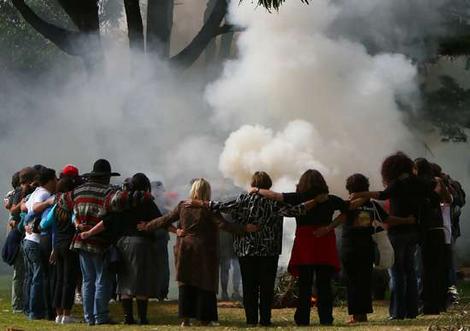On a hill not far from the Sidney Myer Music Bowl, a small fire
is tended night and day by indigenous activists who say it is
sacred. The demonstrators at Melbourne's "Camp Sovereignty"
complied with a Melbourne City Council directive and pulled down
the tents that had been standing in Kings Domain since the start of
the Commonwealth Games.
Earlier, I had sat in the public gallery of the Supreme Court
and listened to Justice Betty King give short shrift to the pleas
of the protesters for the tent city to be retained. The sacred fire
would remain - protected by an emergency declaration made under the
Federal Government's cultural heritage legislation - but the tents
and caravans would have to go.
The City of Melbourne was being accommodating. It did not apply
for the fire to be extinguished, and even offered to help the
protesters move the fire. Lord Mayor John So was clearly willing to
negotiate. The State Government, for its part, was happy to declare
itself a non-combatant and shelter behind the skirts of the
council.
These courtroom skirmishes determine only what is lawful. The
more abstract concepts of justice and fairness must remain the
province of legislatures rather than courts. It's simply not
reasonable for the community to expect courts to act as instruments
of social justice.
Camp Sovereignty was located not far from the spot where a
plaque commemorates the interment of the skeletal remains of
Aboriginal people from many of Victoria's Aboriginal nations. They
are the ancestors of today's indigenous Victorians.
In some quarters, there may be dispute about whether this little
pocket of Melbourne parkland belongs to the Boonerwrung people,
whose country stretches away to the south towards Wilsons
Promontory - or to the Wurundjeri, who own the land to the east of
the city. What is not in doubt is that before the Europeans arrived
with their intolerance and gunpowder, the whole of the country was
Aboriginal land. There was no treaty. There was no ceding of
land.
Hence the ire of the Black GST group, whose title reflects its
aims of ending Genocide, acknowledging Sovereignty and securing a
Treaty.
The media focus on the Commonwealth Games provided an
opportunity to raise awareness around the world of the injustices
meted out to indigenous Australians over the past 200-odd
years.
The Black GST crew dubbed the event the "Stolenwealth Games",
reflecting the fact that Aboriginal people were dispossessed of
their land without compensation, and brutally mistreated by the
invaders.
Some events staged by the indigenous lobby group Australians for
Native Title and Reconciliation did generate much publicity for the
cause of indigenous justice.
Oversize letters that spelt out the words "Stolenwealth Games"
received widespread coverage. A ceremonial fire was lit and
visitors to the camp were invited to participate in a smoking
ceremony.
However, the trade-off with media actions of this kind is that
the ensuing discussion focuses on "colour and movement" rather than
the more substantive issues. The discussion around the water cooler
tends to be, "How can a fire that was only lit a month ago be
sacred?", rather than, "Do the protesters have a genuine
claim?"
Camp Sovereignty spokesman Robbie Thorpe tried to keep the story
bubbling, speculating on one occasion about the relative courage of
indigenous and non-indigenous soldiers. Widespread publicityensued,
but the long-term merits of this strategy remain problematic.
The mainstream media coverage of the event has varied.
Considerable focus was given to the racial make-up of the
protesters, inviting the absurd conclusion that fair-skinned folk
had no business in campaigning for indigenous justice. One tabloid
columnist even saw fit to speculate on the percentage of "British
blood" flowing through the veins of one of the Camp Sovereignty
representatives.
A curious aspect of indigenous protest politics is that
whitefellas in positions of power always expect Aboriginal people
to play scrupulously by the rules. That is to say, "the rules" that
were put in place after indigenous Australians had been stripped of
their country and their possessions. It takes a lot of gall to
steal everything people own and then squeal when they light a fire
without a permit.
At Kings Domain, the tents and caravans have gone, and the fire
is likely to be moved or extinguished in due course. But the flame
of indigenous justice continues to burn.
Graham Ring writes for the National Indigenous
Times.

